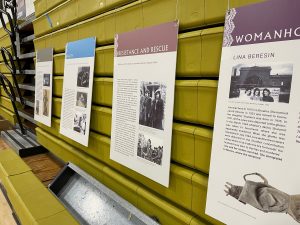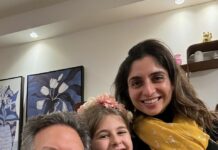Students from 10 different schools around the Baltimore area gathered at the John Carroll School in Bel Air for a special program on Nov. 17 about the aftermath of genocide. “Lessons of the Shoah” focused on the stories of survivors of the Holocaust, the Rwandan genocide and the genocide in Uganda, as well as the psychology of hate and what drives people to become a part of fascist movements.

Over the course of the daylong program, students heard from a variety of speakers. Charles Ota Heller, an author and entrepreneur, spoke of his experience of his family’s oppression under both the Nazi regime in Germany and the Communist government in Czechoslovakia. Eugenie Mukeshimana and Nathalie Mukashaza Piraino, both Rwandan genocide survivors and advocates for human rights, told stories of the horrors they experienced during the killings and the loved ones they lost. Uganda native Father Francis Ouma recounted when his family had to leave their hometown of Atiak when the Lord’s Resistance Army, an extremist terrorist group led by Joseph Kony, took over.
The theme of study for the year was “The Aftermath of Genocide From the Holocaust to the Present.”
During the event, students had the opportunity to ask questions about the speakers’ experiences and participate in smaller group activities, where they analyzed the themes of their stories and why people participate in large-scale hatred.
‘Vital on so many levels’
Under the tutelage of their Human Rights Instructor and External Holocaust Program Coordinator Louise Géczy, the John Carroll School has been hosting educational events about genocide for the past decade. The events are co-sponsored by the Baltimore Jewish Council and the Klein Family Foundation. Andrew Klein, who was part of the Klein family, graduated from John Carroll School in 1971, leading to the foundation’s support of the school.
Though the John Carroll School is a private Catholic high school, it is very active in the field of Holocaust education. In fact, it currently has a program that allows senior students to visit the United States Holocaust Memorial Museum in Washington, D.C.
“We’re very blessed as an institution that we understand that education about genocide is important and vital on so many levels,” said Géczy.
Géczy coordinated the event alongside Emily Braverman Goodman, the director of Holocaust and antisemitism program at the Baltimore Jewish Council. The former is also responsible for organizing several other Shoah-related events at the school, such as the Genocide Awareness Vigil and its Holocaust Remembrance Day programming.
“It’s important for students to realize that this history is not that old, and that there’s genocide happening now,” said Goodman. “Here they can learn skills to combat what’s happening and make a difference even in a small way.”
“We decided we would look at the aftermath of genocide this time,” added Géczy. “Because a lot of the time, that’s not covered. Too often students think that once a genocide ended, everyone went home and lived happily ever after.”
‘Don’t be afraid of doing things’
The schools involved in the program ran the gamut of public to private, with both religious and secular curricula. Some of the schools with students attending “Lessons of the Shoah” included Bel Air High School, Towson High School, Beth Tfiloh and Garrison Forest.
Heller, one of the speakers at the event and a Holocaust survivor who said he once shot a Nazi in self-defense, has been coming to the John Carroll School to speak about genocide and hate crimes for years now. He became involved with the school’s Holocaust-related programming through the Baltimore Jewish Council around 2011, when he first started writing books about his experience.
“It’s important for people to understand, remember and hopefully prevent [genocide] from happening again,” he said on the importance of this kind of programming amid the rise of antisemitism.
Ultimately, the underlying message of the program was that even if one is not affected by widespread hate, anyone has the power “to be an upstander, rather than a passive bystander” and strive to prevent instances from happening. The speakers stressed the importance of direct action and lending a hand in such situations, as people who accomplished that were often what helped them survive.
“Don’t be afraid of doing things, even if they’re not popular,” stressed Mukeshimana, who spoke of the aid she received in Rwanda. “Actions that were not popular at the time were the reason I survived.”






